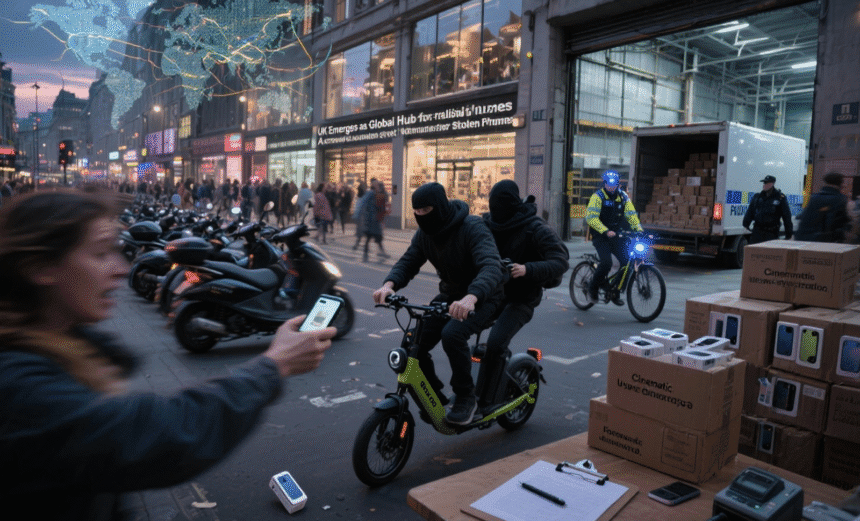The United Kingdom, and London in particular, has rapidly emerged as a global hub for stolen mobile phones, with organised criminal networks stealing tens of thousands of devices each year and exporting them overseas to reap massive profits. A major Metropolitan Police operation earlier this month, on October 7, 2025, uncovered one such network accused of exporting around 40,000 stolen smartphones to China over the past year, a staggering revelation that underscores how deeply entrenched the trade has become in the UK. Officers described the bust as their largest yet, signalling that the country has become a key node in a sophisticated international supply chain for stolen technology.
Police data and parliamentary reports reveal that the surge in thefts accelerated sharply through 2024 and into 2025, driven by London’s dense population, its high tourist traffic, and the prevalence of valuable devices in public spaces. An estimated 80,000 mobile phones were reported stolen in London alone in 2024, making the capital not just the UK’s hotspot but one of Europe’s worst-affected cities. Westminster, Soho, and Oxford Street are among the most targeted areas, with snatch-and-grab incidents often occurring in seconds. Gangs typically operate in groups, using e-bikes or mopeds to swoop in, grab phones from pedestrians or drivers, and vanish before victims can react.
Experts say the UK’s status as a hub stems from a combination of high resale value abroad, low prosecution rates at home, and booming global demand for second-hand devices. In countries such as China, Nigeria, and parts of North Africa, stolen smartphones, especially iPhones, can fetch prices two or three times higher than in the UK. Many of these markets have weaker phone-blocking systems, allowing devices that are marked as stolen in Britain to be reflashed, unlocked, or stripped for parts. With enormous profit margins and limited risks of being caught or convicted, the trade has proven irresistible to criminal gangs.
Financially, the scale of losses is striking. The total value of stolen phones in London in 2024 was estimated at around £50 million, excluding further financial damage from identity theft or data breaches. Insurers report that around 40% of all mobile phone thefts in Europe now occur in the UK, despite the country having only a fraction of the continent’s mobile users. The recent police operation revealed that the single network dismantled this month may have been responsible for nearly half of all phones stolen in the capital, a figure that shows how centralised and well-organised the trade has become.
Much of the illicit trade follows a predictable pattern. Once stolen, phones are quickly passed to local “fences” or middlemen who sell them to repair shops or exporters. From there, shipments are concealed within legitimate consignments, sometimes in used-electronics containers or falsely labelled packages, before being dispatched overseas. Investigators say that Hong Kong and mainland China have become major destinations, with phones also traced to West African countries like Nigeria and parts of North Africa, where refurbishers and traders dismantle or resell them through informal markets. These international links turn what begins as petty street crime into a lucrative global export operation.
The Metropolitan Police and government agencies have begun to respond more aggressively. Police forces have increased surveillance, set up specialist task forces, and deployed bike-mounted and plain-clothes officers in high-risk areas. The October raids, which resulted in dozens of arrests and warehouse seizures, mark a shift from targeting small-time street thieves to going after organised export ringleaders. Meanwhile, Members of Parliament are pressuring smartphone manufacturers and tech giants to develop stronger anti-theft measures, such as improved IMEI tracking and cloud-based locks that could render stolen phones useless to buyers abroad.
Despite these efforts, the trade remains difficult to eradicate. The combination of high global demand, fast-moving resale networks, and limited deterrence keeps the pipeline active. Experts say that without making stolen phones worthless on the international market, the UK will struggle to shake off its new reputation as Europe’s stolen-phone capital. For now, every stolen device represents not just a loss for its owner, but a tiny contribution to an international black market stretching from London’s West End to the warehouses of Hong Kong and beyond.

















